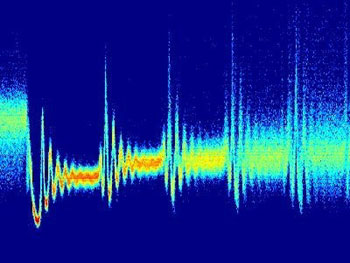| 2003 |

|
YEAR BOOK |
University College Cork
|
Nonlinear dynamics of semiconductor lasers
|

At University College Cork, we analyse the possibility of designing semiconductor lasers that will work without an optical isolator. We both analyse the stability of lasers under the presence of back reflections, and the possibility of designing novel devices that are insensitive to optical feedback.
To understand the stability of semiconductor lasers under the influence of optical feedback, we design and carry out experiments where the light emitted by the laser is re-injected into the laser after reflection from a distant mirror. Using optical attenuators, we can control the amount of light re-injected into the device and characterise feedback-induced instabilities.
In the last few years, we have also analysed experimentally the extremely fast fluctuations of lasers with optical feedback and developed a general understanding of the underlying physics. The experimental results have been compared with numerical simulations of a generic model for semiconductor lasers where the re-injected light appears as a memory term. In collaboration with mathematicians working at UCC and abroad, we have further simplified the mathematical description of lasers with optical feedback and provided a simple view for these instabilities.
Although understanding the origin of these instabilities is of general interest for non-linear dynamics, we also want to provide a practical method of designing semiconductor lasers that are insensitive to back reflections. We have recently demonstrated and explained that novel semiconductor lasers fabricated from quantum dot material have a reduced sensitivity to optical feedback. While quantum well semiconductor lasers, which are commonly used, relax after a perturbation with damped harmonic oscillations, quantum dot semiconductor lasers respond with over-damped relaxations. This simple difference leads to a greatly enhanced resistance to instability and provides a route to lasers that are stable by design.
This project is generously supported by Science Foundation Ireland.
Contact: Dr Guillaume Huyet, Physics Department, University College Cork; E-mail [email protected]